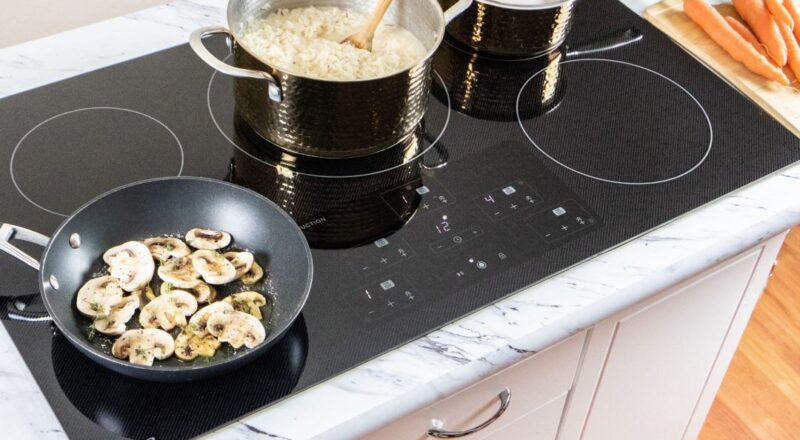When it comes to cooking, many people love using cast iron cookware. It is known for its durability and excellent heat retention. However, with the growing popularity of induction cooktops, some concerns about the overheating risks associated with cast iron have emerged. Understanding these risks is crucial for maintaining kitchen safety and ensuring your meals are cooked to perfection.

Understanding Induction Cooking
Induction cooking is a modern method that uses electromagnetic energy to heat pots and pans directly. Unlike traditional gas or electric stovetops, induction cooktops remain cool to the touch, making them a safer option for many households. However, the powerful magnetic fields they produce can cause certain cookware, like cast iron, to heat up very quickly.
Why Cast Iron?
Cast iron cookware has been a staple in kitchens worldwide for centuries. Its ability to retain heat and distribute it evenly makes it ideal for various cooking techniques, such as frying, searing, and baking. Additionally, cast iron is incredibly durable, often lasting for generations when properly cared for.
Compatibility with Induction
One of the reasons why cast iron is popular for induction cooking is its magnetic properties. This makes it compatible with induction cooktops, providing a quick and efficient cooking experience. However, this compatibility also brings certain risks, particularly the potential for overheating.
Potential Risks of Overheating
While cast iron is renowned for its heat retention, it is also prone to overheating when used on induction cooktops. This can lead to several issues, including:
- Warping: Excessive heat can cause cast iron cookware to warp, potentially damaging the pan and affecting its cooking performance.
- Cracking: Sudden temperature changes, such as placing a hot pan under cold water, can cause cast iron to crack.
- Burnt Food: Overheating can lead to food burning quickly, resulting in a less enjoyable meal and difficult cleanup.
Preventing Overheating
Preventing overheating when using cast iron on induction cooktops requires careful attention and a few simple strategies:
Monitor Heat Levels
Keeping an eye on the heat levels is crucial. Start with a lower heat setting and gradually increase it as needed. This helps prevent your cast iron cookware from getting too hot too quickly.
Use a Diffuser
Using a heat diffuser can help distribute heat more evenly across the surface of your cast iron pan. This can prevent hot spots and reduce the risk of overheating.
Preheat Properly
Preheating your cast iron pan on low heat before increasing the temperature can prevent sudden temperature shocks that lead to overheating and potential damage.
Benefits of Cast Iron on Induction
Despite the risks, using cast iron on induction cooktops offers several benefits:
- Efficiency: Induction cooking is highly efficient, reducing cooking times and energy consumption.
- Even Heating: Cast iron provides consistent and even heat distribution, ensuring your food is cooked thoroughly.
- Versatility: Cast iron pans can be used for a wide range of cooking techniques, from searing meat to baking pizza.
Maintaining Your Cast Iron Cookware
Proper maintenance is key to extending the life of your cast iron cookware and ensuring it remains safe for induction use.
Cleaning
Always clean your cast iron pan after each use, either by wiping it down with a paper towel or using a small amount of water and a brush. Avoid soap, as it can strip the seasoning.
Seasoning
Regularly season your cast iron cookware to maintain its non-stick properties and prevent rust. This involves coating it with a thin layer of oil and heating it to high temperatures.
Storage
Store your cast iron in a dry place to avoid moisture buildup, which can lead to rust.
Common Misconceptions
There are several misconceptions about the use of cast iron on induction cooktops:
Induction Cooktops Damage Cast Iron
While induction cooktops can cause cast iron to overheat, they do not inherently damage the cookware. Proper use and maintenance can prevent any potential issues.
All Cast Iron Pans Work on Induction
Not all cast iron cookware is suitable for induction cooktops. Some pans may have uneven bottoms or be too thick to work effectively with induction technology.
Conclusion
Understanding the overheating risks of using cast iron on induction cooktops is essential for kitchen safety and cooking success. By taking the necessary precautions and maintaining your cookware, you can enjoy the benefits of cast iron without the worries of damage or burnt meals.
For more information on using cast iron on induction, you can visit this resource.

FAQs
Can I use any cast iron pan on an induction cooktop?
Not all cast iron cookware is suitable for induction. Ensure your pan has a flat base that makes full contact with the cooktop surface.
What should I do if my cast iron pan overheats?
If your cast iron pan overheats, remove it from the heat source immediately and allow it to cool naturally. Avoid placing it in cold water to prevent cracking.
Is seasoning necessary for cast iron used on induction?
Yes, regular seasoning is necessary to maintain the non-stick properties of your cast iron cookware and prevent rust.
This article contains affiliate links. We may earn a commission at no extra cost to you.

